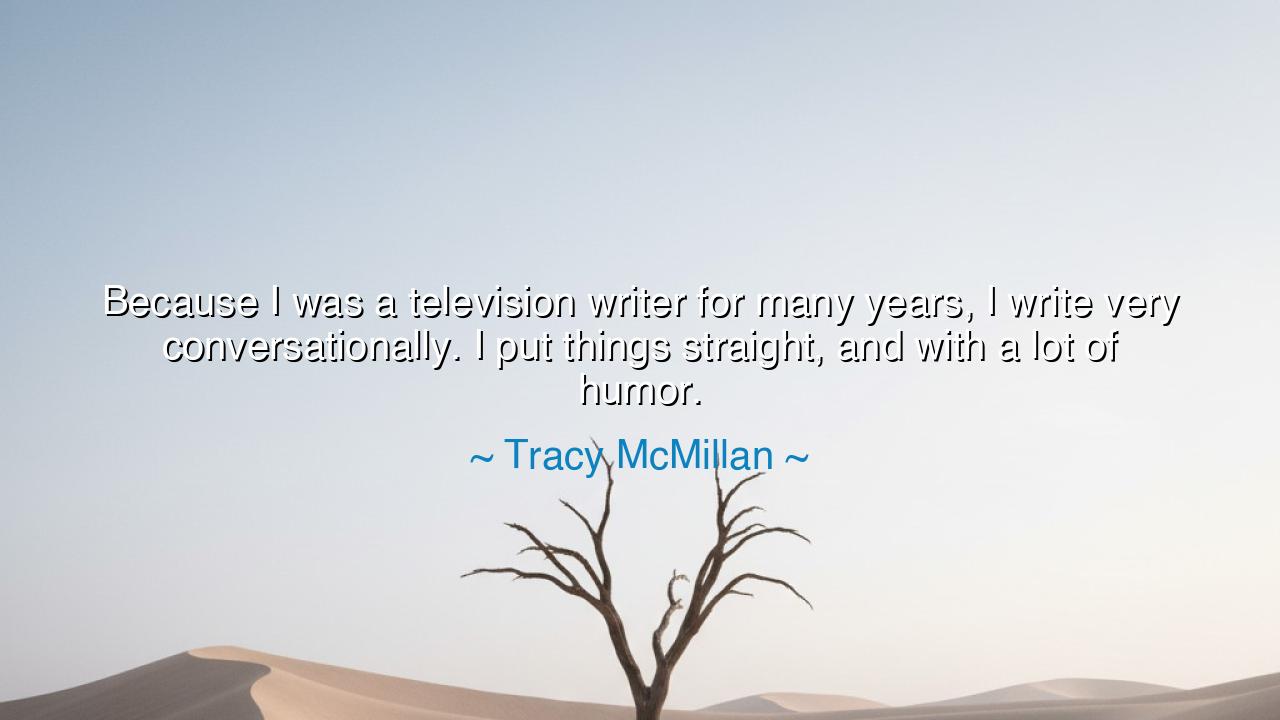
Because I was a television writer for many years, I write very
Because I was a television writer for many years, I write very conversationally. I put things straight, and with a lot of humor.






When Tracy McMillan declared, “Because I was a television writer for many years, I write very conversationally. I put things straight, and with a lot of humor,” she revealed a timeless principle—truth spoken plainly, wisdom clothed in laughter, and connection through the rhythm of human speech. Her words are a hymn to simplicity, to clarity, and to the sacred bond between speaker and listener. For in a world that often hides behind grandeur and pretense, she reminds us that the most powerful language is not lofty—it is alive, direct, and true.
To write “conversationally” is to speak as one soul to another, without barrier or disguise. It is to understand that the written word is not merely ink upon paper, but breath captured in symbols—a conversation that outlives the speaker. In ancient times, the wise teachers of the Agora or the courtyards of China did not thunder from marble thrones; they spoke as friends among friends, letting their words flow naturally, letting truth reveal itself not through complexity but through authenticity. So too does McMillan follow this sacred path. Her writing, forged in the fires of television storytelling, is not meant to impress but to connect, not to preach but to touch.
Her commitment to “put things straight” carries the strength of moral clarity. To speak straight is to cut through illusion, to lay bare what is hidden beneath layers of polite deceit. In every age, there have been those who dared to speak thus—the prophets, the philosophers, the poets unafraid of offense because they sought not comfort, but truth. Socrates, who walked barefoot through Athens questioning the mighty, spoke with such simplicity that his words shook empires. Like McMillan, he did not weave ornate riddles; he spoke directly, yet his simplicity contained universes. In her humor, as in his irony, truth shines most brightly—because laughter disarms the ego and allows the heart to listen.
And then she adds, “with a lot of humor.” Ah, there lies the gold! For humor, when wielded wisely, is not mockery but mercy. It is the gentle fire that warms without burning, the mirror that shows our folly without shaming us for it. The ancients knew that laughter and wisdom were sisters. Even the great Zen masters taught through paradox and jest, for they knew that enlightenment enters not through solemnity, but through sudden clarity—a flash of joy that makes sense of all confusion. McMillan’s humor, too, is born not from cynicism but from understanding; it is the laughter of one who has suffered and survived, and now tells her story not with bitterness, but with grace.
To write in this way—to be conversational, straight, and humorous—is to speak life into one’s work. It is to remember that words are bridges, not walls. Many in the modern age forget this, seeking instead to sound wise rather than to be wise. They cloak their meaning in ornament, as though mystery itself were a mark of depth. But McMillan reminds us that the deepest truths are also the most human. When she writes, she does not seek to dazzle but to reach, and it is this reaching—the hand extended through honesty and laughter—that makes her voice eternal.
There is a tale from the life of Abraham Lincoln, a man of immense sorrow who wielded humor as a balm for both himself and others. In the midst of war, when tempers flared and hope was dim, Lincoln would tell stories that brought laughter to his weary generals. They thought him frivolous, yet they did not see that his humor was courage—that by speaking simply and warmly, he restored faith to broken hearts. Like McMillan, he understood that to communicate deeply, one must be human first and eloquent second.
So, dear reader, let this be your lesson: speak truth simply, and let laughter guard your wisdom. When you write, when you speak, when you live—do not seek to sound grand, but to sound real. Be conversational, not performative. Be straight, not cruel. Let humor be the salt that keeps your truth from growing bitter. The world does not need more sermons—it needs more conversations, more honesty spoken with warmth, more wisdom carried on the breath of kindness.
And remember this final truth: words are bridges of the soul. When you make them simple, they carry love. When you make them honest, they carry power. And when you make them humorous, they carry healing. Tracy McMillan’s way is not just a writer’s craft—it is a way of living. Speak as she writes: plainly, truthfully, joyfully. For when the heart speaks without disguise, even the gods pause to listen.






AAdministratorAdministrator
Welcome, honored guests. Please leave a comment, we will respond soon